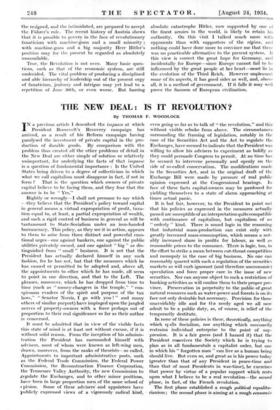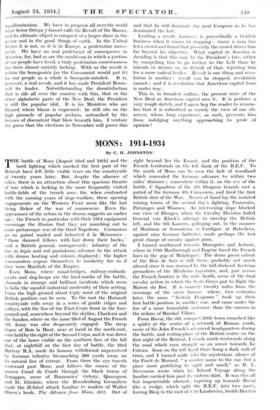THE NEW DEAL : IS IT REVOLUTION ?
By THOMAS F. WOODLOCK
IN a previous article I described the impasse at which President Roosevelt's Recovery campaign has arrived, as a result of his Reform campaign having paralysed the investment of private capital in the pro- duction of durable goods. By comparison with the problem thus created all the other problems of detail, in the New Deal are either simple of solution or relatively unimportant, for underlying the facts of that impasse is a question of fundamental importance : Is the United States being driven to a degree of collectivism in which what we call capitalism must disappear in fact, if not in form ? That is the question which owners of private capital believe to be facing them, and they fear that the answer is to be " Yes."
Rightly or wrongly—I shall not presume to say which —they believe that the President's policy toward capital in general means a virtual expropriation of profit, taxa- tion equal to, at least, a partial expropriation of wealth, and such a rigid control of business in general as will be tantamount to State-Socialism under an iron-handed bureaucracy. This policy, as they see it in action, appears to them to arise from three distinct and powerful emo- tional urges—one against bankers, one against the public utilities privately owned, and one against " big " as dis- tinguished from " small " business. It is not that the President has actually declared himself in any such fashion, for he has not, but that the measures which he has caused or permitted to be adopted and, above all, the appointments to office which he has made, all seem to point in one direction, and that to the Left. The phrases, moreover, which he has dropped from time to time (such as " money-changers in the temple," " con- spicuous evaders of the spirit and purpose of the tax laws," " Senator Norris, I go with you ! " and many others of similar purport) have impinged upon the jangled nerves of property-owners with a force perhaps out of proportion to their real significance so far as their author is concerned.
It must be admitted that in view of the visible facts this state of mind is at least not without excuse, if it is without solid reason. From the inception of his adminis- tration the President has surrounded himself with advisers, most of whom were known as left-wing men, drawn, moreover, from the ranks of theorists—so called. Appointments to important administrative posts, such as the Federal Trade Commission, the Federal Power Commission, the Reconstruction Finance Corporation, the Tennessee Valley Authority, the new Commission to _regulate the Exchanges, and to other minor positions, have been in large proportion men of the same school of cpinion. Some of these advisers' and appointees have publicly expressed views of a vigorously radical kind, even going so far as to talk of " the revolution," and this without visible rebuke from above. The circumstances surrounding the framing of legislation, notably in the case of the Securities Act and the Act to regulate the Exchanges, have seemed to indicate that the President was willing to allow his advisers to experiment as boldly as they could persuade Congress to permit. At no time has he seemed to intervene personally and openly on the side of so-called conservatism. The modifications made in the Securities Act, and in the original draft of the Exchange Bill were made by pressure of real public opinion expressed at the Congressional hearings. In face of these facts capital-owners may be pardoned for yielding themselves to a state of alarm approaching at times actual panic.
It is but fair, however, to the President to point out that his policies as expressed in the measures actually passed are susceptible of an interpretation quite compatible with continuance of capitalism, but capitalism of an " orderly " kind. There is sound logic in the reasoning that industrial mass-production can exist only with greatly increased mass-consumption, which means a not- ably increased share in profits for labour, as well as reasonable prices to the consumer. There is logic, too, in the effort to strike a mean between cut-throat competition and monopoly in the case of big business. No one can reasonably quarrel with such a regulation of the securities markets as will curb ignorant (and therefore uneconomic) speculation and force proper care in the issue of new securities. Nor can anyone object to such a restriction of banking activities as will confine them to their proper pro- vince. Preservation in perpetuity to the public of great natural resources such as water-power and forests is on its face not only desirable but necessary. Provision for those unavoidably idle and for tile needy aged we all now admit to be a public duty, as, of course, is relief of the temporarily destitute.
. In none of these policies is there, theoretically, anything whieh spdls Socialism, nor anything which necessarily restrains individual enterprise to the point of sup- pression. It is a fair guess (and I hazard it) that the President conceives the Society which he is trying to plan as in all fundamentals a capitalist order, but one in which his " forgotten man " can live as a human being should live. But even so, and great as is his power today (greater than that of any President in peace-time and than that of most Presidents in war-time), he exercises that power by virtue of a popular support which rests upon what I believe to be a real revolution—the second phase, in fact, of the French revolution.
The first phase established a rough political equalita- rianism; the second phase is aiming at a rough economic equalitarianism. , We have in progress all, over the world what Senor Ortega y Gasset calls the Revolt of the Masses, and its ultimate object is conquest of a larger share in the power and in the good things of earth. In the United States it is not, as it is in Europe, a proletarian move- ment. We have no real proletariat. of consequence in America, for,-bad as are the conditions in which a portion of our people have lived, a truly proletarian consciousness has been almost entirely lacking. With us the revolt is within the bourgeoisie (as the Communist would put it) for our people as a whole is bourgeois-minded. It is, however, a real revolt, and it has made President Roose- velt its leader. - Notwithstanding the dissatisfaction that is rife all over the country with this, that or the other alphabetic parts of the New Deal, the President is still the popular idol. It is his Ministers who are blamed where blame is expressed; he still sits on the high pinnacle of popular acclaim, untouched by the breezes of discontent that blow beneath him. I venture the guess that the elections in November will prove this and that he will dominate the next Congress as he has dominated the last.
Leading a revolt, however, is proverbially a ticklish business when it comes to stopping : many a man has led a crowd and found that presently the crowd drives him far beyond his objective. What capital in America is dreading is that this may be the President's fate, either by compelling him to go farther to the Left than he intends or desires, or. in default of that, rejecting him for a more radical leader. Revolt is one thing and revo- lution is another : revolt can be stopped, revolution cannot ; and it is revolution that American capital fears is under way.
This is, in broadest outline, the present state of the New Deal as American capital sees it. It is perforce a very rough sketch, and I again beg the reader to remem- ber that it is submitted as merely the view of one ob- server, whose long experience, as such, prevents him from indulging anything approaching to pride of opinion !



































 Previous page
Previous page